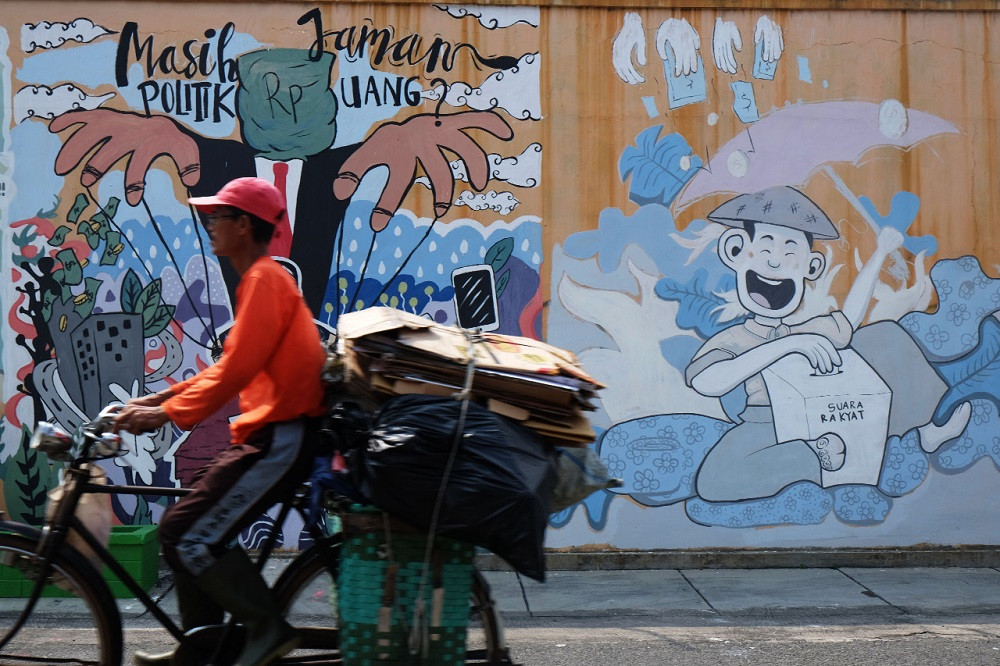Popular Reads
Top Results
Can't find what you're looking for?
View all search resultsPopular Reads
Top Results
Can't find what you're looking for?
View all search resultsBetween building democracy and maintaining integration
Democracy seeks to open up a broad spectrum of freedoms so that every person or group of people can fight for their aspirations freely, whereas integration tends to seek to curb freedoms so that a nation remains united.
Change text size
Gift Premium Articles
to Anyone
T
he development of democracy is inevitably demanded of the government in this modern era, while on the other hand, the spirit of democracy often creates vertical and horizontal conflicts that disrupt peace, order and security in a country.
In an old article entitled “Integrative Revolution, Primordial Sentiments and Civil Politics in the New States”, Clifford Geertz discussed the symptoms of distortion in a democratic environment such as those Indonesia faces nowadays. Geertz noted the dilemma new democracies often faced because they were required to build two things at once – even though they often conflicted – namely democracy and integration.
Democracy is needed not only to put people in a central position and as a determinant of the policy direction of the government but also as a decision-making mechanism regarding state policies in a pluralistic nation-state with various primordial ties. Meanwhile, integration is needed so that a pluralistic nation remains united in a strong national bond.
The dilemma is that democracy and integration often go in the opposite direction. Some even say they have a contradictory character. Democracy wants to open up a broad spectrum of freedoms so that every person or group of people (including primordial groups) can fight for their aspirations freely, whereas integration tends to seek to curb freedoms so that the nation remains united.
Many countries can overcome this, but some countries cannot easily overcome the issues and are still looking for an appropriate format that can harmonize the journey of democratic development and integration.
Despite not being on the extremes, Indonesia has faced the same dilemma in several stages of its history, including recent developments. The beginning of every political change in Indonesia is always marked by the spirit of democratization, but over time, it leads to certain excessive interpretations of freedom.
Consequently, to maintain integration, the government is then required to take certain repressive measures. In the reformation era, Indonesia initially succeeded in stopping the New Order government, which was considered authoritarian and was too strict in guarding integration by enforcing some extremely repressive measures.
The Reform Era since 1998 started by reforming the political system, such as by revising various laws in the political sector, amending the 1945 Constitution, abolishing the dual function of the military, forming new institutions intended to monitor the performance of the government so as not to fall into authoritarianism and a policy regime that was undemocratic.
Initially, this democratization policy worked quite well. The 1999 election was considered a democratic election, both in terms of its regulation and implementation, and in the field of legal development, Indonesia established a Corruption Eradication Commission, Constitutional Court and Judicial Commission.
It also revoked expansion of regional autonomy, strengthened civil society and so on. So in the beginning, the journey of reform had indeed built a political system that was conducive to democracy and constitutional supremacy.
But over time, this democratization began to cause problems because it was considered to have opened an overstretched interpretation and practice of freedom, including the freedoms to defraud and deceive, accompanied by various political transactions at the elite level, thus growing the seeds of oligarchy.
Meanwhile, at the community level, movements that are not easy to control have grown so that territorial integration and ideological integration begin to experience disruption, polarization and contradictions in the process, affected by the emerging primordial ties.
This situation is exacerbated by the emergence of various hoaxes through digital technology, which has led to what is often referred to as digital arbitrariness. The public therefore demanded the presence of the state by it taking firm action against the distortion of democracy, which began to threaten integration and disturb the peace, order and security of our lives.
The government is trying to take measured steps to maintain a balance between the right to democracy and the obligation to maintain integration. The debate will, of course, continue through a fairly strong political process that is pulling against one another, that is, the calls for freedom as a spirit of democratization on one side and the calls for firm action and evidence of the state's presence in maintaining integration of the country on the other side.
Practically speaking, realizing this process is often colored with hoaxes and distortion on digital platforms, it is sometimes even difficult for us to find boundaries and make the choice between actions of building democracy and maintaining integration. When integration is being enforced too strictly, the government is accused of being authoritarian, but when it is too liberating in its democratic process, the state is considered to have allowed democracy itself to be under threat.
Normatively, we all know the boundary is legal supremacy, but that it is always easier said than done.
Whenever possible, we can also find a more acceptable strategy and implementable steps – that is, building democracy without jeopardizing integration – without being trapped in the dilemma of choosing between the two.
***
The writer is the coordinating minister for political, legal and security affairs. The article was part of his keynote speech delivered at the virtual seminar “Facing Current Challenges of Democracy, Peace, and Security” organized by the Indonesian Institute of Sciences and the Asia Pacific Peace Research Association on Jan. 7.










